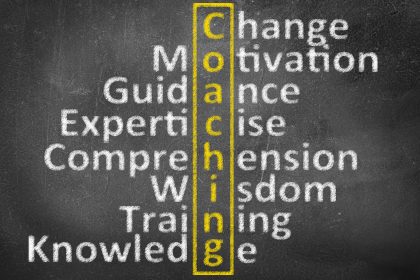
The intersection of artificial intelligence and human expertise is revolutionizing coaching practices. This article provides a deep dive into the topic, offering exclusive insights from industry leaders who navigate this complex terrain. Discover how AI is shaping the future of coaching, complementing but never replacing the irreplaceable human touch.
● AI Supports, But Can’t Replace Human Coaching
● AI Assists, Human Connection Drives Coaching
● AI Aids, But Lacks Emotional Intelligence
● AI Enhances, But Human Insight Crucial
● AI Democratizes Coaching, Making It Accessible
● AI Is A Resource, Not A Replacement
● AI Enhances Coaching, Human Touch Essential
● AI Can’t See, Coaches Identify Avoidance
● AI Coach Extends Reach, Complements Human Efforts
● AI Agents Enhance Coaching, Not Replace It
● AI Supports, Human Insight Drives Breakthroughs
● AI For Admin, Human Insight for Coaching
● AI Assists, Human Connection Key in Coaching
AI Supports, But Can’t Replace Human Coaching
As an executive coach, I have mixed feelings about the use of AI in coaching. I’m deeply skeptical about an AI’s ability to truly understand the nuanced, personal nature of the coaching relationship. Effective coaching relies on the human-to-human connection and emotional intelligence that AI cannot replicate.
However, I do find AI helpful in supporting roles. I leverage AI tools for note-taking, allowing me to focus more on client interactions. The AI can then compile my notes, identify themes, and suggest areas to explore further—insights I may not have considered.
Additionally, AI can complement coaching for clients already familiar with the process, providing efficient access to relevant strategies and resources. But I would never recommend replacing a human coach entirely, as that interpersonal dynamic is irreplaceable. The most impactful coaching requires a skilled human practitioner who can establish trust and guide clients through their unique challenges. AI should enhance and support this process, not supplant it.
Joshua Miller, Master Certified Executive Leadership Coach, Joshua Miller Executive Coaching
AI Assists, Human Connection Drives Coaching
I believe AI can certainly play a supporting role in coaching, but it will never replace the human connection central to the process. Coaching is about connecting with the person, not just solving a problem, and that connection is driven by empathy, understanding, and real-time interaction.
AI can assist with tasks like resume shaping, presentation outlines, or competitive research, but it lacks the nuanced perception of body language and emotional shifts that a coach brings to each session. We are trained to recognize when something is unsaid or when a shift in mood occurs, prompting different questions that can lead to breakthroughs.
While AI is a valuable tool for certain administrative aspects, it cannot replicate the depth of human interaction that is fundamental to effective coaching. AI can complement coaching at its best, but the human coach drives transformative conversations and outcomes.
Jennifer Frigault, Founder & Executive Coach, Spire Vision Leadership
AI Aids, But Lacks Emotional Intelligence
As a life coach, I see AI as a powerful tool, but one with clear limitations when it comes to emotional intelligence. Coaching isn’t just about data; it’s about genuine connection, empathy, and understanding the nuances of the human experience.
What AI lacks is the ability to truly feel and respond to emotions. For example, when a client is struggling with self-doubt or dealing with a deeply personal challenge, it’s not just the words they’re saying; it’s the tone, the hesitation, or even what they’re not saying that guides how I approach their needs. That level of emotional understanding is something no algorithm can replicate.
Yes, AI can help streamline parts of the coaching process, but the heart of coaching: building trust, providing empathy, and fostering growth, remains uniquely human. That’s where the real transformation happens, and it’s why the human connection will always be irreplaceable in coaching.
Bayu Prihandito, Psychology Consultant, Life Coach, Founder, Life Architekture
AI Enhances, But Human Insight Crucial
While AI has the potential to improve certain facets of coaching, that functionality is not without its limitations. AI can be an excellent tool for organizing resources, analyzing data, and generating insights, making it a useful assistant in areas like academic and career coaching. AI-powered platforms, for example, can assist clients in recognizing trends on their resumes or delivering personalized job recommendations relevant to their abilities and ambitions.
But for me, when it comes to the nuanced aspects of coaching—including empathy, deep personal insights, and the capacity to navigate the nuances of human experience—I think AI falls short. A business coach, for instance, requires comprehending not only the stats (or metrics) but also the emotions, interpersonal dynamics, and subtle cues that shape success, which AI cannot convey genuinely.
As an example, let me describe my experience working with a business coach. Even though I’ve used AI tools to simplify some tasks, such as scheduling and drafting reports, the real breakthroughs have come when people work together. I remember one time my coach pointed out a blind spot in my leadership style that I had not seen in myself. That insight didn’t come from data—it came from truly getting to know my personality and values.
Matt Bowman, Founder, Thrive Local
AI Democratizes Coaching, Making It Accessible
AI can democratize access to high-quality coaching by providing personalized, affordable, and scalable solutions. Traditional coaching has always been a powerful tool for growth, but its accessibility has often been limited by cost, geography, and availability. Career coaching, for instance, often involves significant fees for services like resume reviews, interview preparation, and career strategy sessions—expenses that many individuals, especially students or early-career professionals, struggle to afford.
AI is changing that dynamic by delivering these services at a fraction of the cost, without compromising on personalization or quality. This democratization is more than just a cost-saving measure—it’s a crucial step toward leveling the playing field. Access to effective coaching can be the key to unlocking opportunities, but until now, it has often been reserved for those with the means to invest heavily in their growth.
I’ve seen firsthand how leveraging AI empowers a wider audience to achieve their career aspirations, regardless of their background or financial limitations. This accessibility ensures that more people can receive the guidance they need to thrive, making the job market-and the world of coaching—more inclusive and equitable.
Mohammad Haqqani, Founder, Seekario
AI Is A Resource, Not A Replacement
I think one of the most important concepts to keep front of mind while incorporating AI into our day-to-day workflows is the reminder that AI should be viewed as a peer (or maybe even more of an intern). It is a fantastic resource to leverage and can dramatically increase your productivity. However, the output of these models still requires tight scrutiny. When thinking about these AI capabilities as they relate to coaching, I use a very similar lens. I can definitely ask AI thought-provoking and more conceptual questions and receive detailed responses, but I often find that they are not 100% grounded in reality.
On the other hand, we have never had such quick and freeform access to the magnitude of information that these LLMs and AI are trained on. It would be just as crazy to ignore and filter out this resource when looking for a coaching resource. AI can be a good resource to use for brainstorming and thought exploration, but before just taking any text that pops out and assuming it is fantastic life advice, definitely make sure to spend some time vetting.
My opinion is that it is a fantastic resource to be able to dig into and unpack deep thoughts and concepts that would be a part of a coaching journey. AI can also help organize and document thoughts with great expertise. However, before taking life advice directly from your AI model, definitely run those ideas by a professional, friend, or at least your own chain of consciousness to make sure the coaching advice you’re receiving isn’t an AI hallucination or misunderstanding.
Oz Rashid, Founder and CEO, MSH
AI Enhances Coaching, Human Touch Essential
AI has become an invaluable tool across various coaching fields, including academic, career, business, health, and life coaching. It is transforming the way coaches interact with clients, streamline processes, and deliver personalized support. However, its use must be balanced with ethical considerations and human expertise to ensure meaningful and effective outcomes.
AI’s ability to analyze large volumes of data quickly and identify patterns makes it a powerful resource for coaches. For instance, in academic and career coaching, AI can assist by recommending tailored learning paths, identifying skill gaps, and providing insights into job market trends. In business coaching, AI tools can analyze operational data, track key performance indicators, and suggest strategies to enhance productivity. For health and life coaching, AI can support habit tracking, emotional well-being monitoring, and goal setting through data-driven insights.
Despite its benefits, AI should not replace the human element of coaching. Coaches bring empathy, intuition, and a deep understanding of individual circumstances, which AI cannot replicate. While AI can provide valuable insights and recommendations, it requires an expert coach to interpret these outputs, contextualize them for the client, and guide the process effectively. This collaboration between AI and coaches ensures that the advice provided is not only accurate but also relevant to the client’s unique needs.
Moreover, ethical considerations are paramount when using AI in coaching. Protecting client privacy, ensuring unbiased algorithms, and maintaining transparency about AI’s role are critical to building trust and delivering ethical coaching experiences.
In essence, AI is here to stay and offers immense potential to enhance coaching practices. When used responsibly and in tandem with skilled coaches, it can improve productivity, provide personalized support, and help clients achieve their goals more efficiently. However, the human touch remains irreplaceable in fostering meaningful connections and delivering impactful guidance.
Suzanne Ricci, Chief Success Officer, Computer Coach Training Center
AI Can’t See, Coaches Identify Avoidance
AI can’t see what you’re avoiding. A good coach can.
People don’t hire coaches because they lack information. They hire coaches because they avoid the hard things: the tough conversations, the big career pivots, the moment they need to step up but don’t. AI doesn’t see that.
I’ve coached CEOs, marketers, and interns, and it’s never about what they really think is wrong. This one CEO came up to me, said she needs better marketing. Five minutes into it, I told her, “Your problem isn’t marketing; it’s that you don’t trust your team, hence you micromanage everything.” AI would give her 10 growth strategies.
AI indeed does serve as a great assistant: performance analysis, pattern tracking, and with pre-programmed advice.
AI coaching will make low-level, transactional coaching obsolete. It will, however, make real, human coaching more valuable than ever. Most of the time, you don’t need more answers or options; you need someone who can tell which question will change everything for you.
Peter Lewis, Chief Marketing Officer, Strategic Pete
AI Coach Extends Reach, Complements Human Efforts
Imagine being able to deploy a coach to your team, 24 hours a day, 7 days a week. Today the cost would be astronomical using one-on-one coaching or even gathering for group coaching. Being able to engage your team where and when they need it, with a coach who can hold space without injecting their own bias and who can draw on a depth of research backed knowledge is something that can truly move the needle in development and performance. Leveraging the power of Retrieval-augmented generation Artificial Intelligence (RAG AI) has the ability to put a professional coach in the palm of your hand. The use of this technology can be a complement or supplement to the learning and development of people.
I utilize RAG AI to complement my work. Using a human-like AI generated coach that is fed proven research allows my clients the opportunity to interact with a human-like coach on demand. AI is extending my reach as a coach and workshop facilitator more than I could have imagined. As I deliver developmental workshops in person, I now have the ability to deploy a human-like AI generated coach to give my clients access to a wide body of knowledge when they need it. This keeps the learning going. I can push information, have check-ins, even have my AI coach call my client to assist in problem solving.
Got a conflict with a team member? Use your AI coach immediately instead of waiting 24-48 hours for a response from me. Need someone to analyze a conversation to see how you can improve your communication? Leverage the power of note-taking and bring in your AI coach for guidance instead of scheduling me to sit in a meeting and observe at a lower capacity based on my own limitations. Finding innovative ways to complement my services with AI in coaching allows me to be everywhere my clients need help. I have been able to focus in my zone of genius. I look forward to exploring more ways to partner with AI so that I can show up as my best self and give my clients every opportunity to learn and grow.
Will Ramey, Owner, Shared Leadership LLC
AI Agents Enhance Coaching, Not Replace It
Jensen Huang, NVIDIA’s CEO, recently highlighted a major shift in the AI world by saying that AI agents (“agentic AI”) are likely the next trillion-dollar opportunity. This shows how much potential these AI systems have to transform industries.
For coaches, AI agents can be game changers by acting as personalized assistants for both the coach and the client. They can send tailored session reminders to clients, track their progress, or even suggest high-quality, high-impact next steps that you’ve outlined, based on their goals. For example, as business and personal development coaches, we’re looking into AI agents that analyze data and recommend strategies. Coaches could also use AI agents to streamline their workflows, such as automating client onboarding, scheduling, or progress reports.
These tools free up time for coaches to focus on the deeper, transformative work with their clients while ensuring their clients stay supported and engaged throughout their journey. As coaches, we’re using our deep emotional understanding and complex problem-solving skills that require empathy and the ability to navigate nuanced conversations—qualities that AI lacks.
The key is using AI agents to enhance the experience, not replace the personal connection that makes coaching effective.
Sheryl Landry, Founder, The Infinity Initiative
AI Supports, Human Insight Drives Breakthroughs
Coaching helps people make real shifts in their thinking, and in my experience, AI can assist with structure but struggles with the depth that makes coaching valuable. I believe AI works best when it keeps track of progress, organizes insights, and helps identify patterns, but real breakthroughs happen when a coach pushes someone to see things in a way they hadn’t before.
AI misses the human element that makes coaching effective. I’ve seen clients say they want business strategy help when the real issue is fear of failure or second-guessing decisions. AI can suggest generic solutions, but it won’t pick up on subtle cues like hesitation, frustration, or a shift in tone. In fact, I think the best coaching happens in moments of discomfort, when someone is challenged beyond their comfort zone. That’s something an algorithm can’t replicate. AI can support coaching, but the most valuable growth happens through real human conversations.
Tom Hamilton Stubber, Managing Director, TutorCruncher
AI For Admin, Human Insight for Coaching
As a productivity coach, I use AI for the “behind-the-scenes” parts of my business. For example, I use Zapier to track sales calls, Fathom to take notes, and ChatGPT to create SOPs for my team members. I DON’T use it in actual coaching sessions, because I believe that’s where genuine human insight and connection matter most.
That said, every coach is different. If you decide to incorporate AI into your coaching sessions, that’s fine—but you need to be transparent. Be honest and upfront with your clients about how and when you’re using AI so they understand which elements of your service are automated versus uniquely tailored to their needs.
Carey Bentley, CEO, Lifehack Method
AI Assists, Human Connection Key In Coaching
AI can help an academic/career coach with processing academic major/career test results and responding to simple repetitive questions, but at this point nothing can replace human contact. Students resonate strongly with coaches who are confident yet vulnerable, who are willing to share their unique stories of grit and determination as opposed to general platitudes. A well-trained AI can say all of the right things, but it cannot pick up on nonverbal communication or create a strong bond of empathy with a student.
Additionally, since every institution has its own peculiarities insider knowledge can make a crucial difference in successful outcomes. Even in a large institution like my own, I know the majority of the professors and how tactics that work in one class may backfire in another. An AI cannot replicate the experiential knowledge required, for example, in helping a student determine exactly which instructor or section to take for a specific class. Finally, coaching is frequently tied in with networks and referrals contingent on local factors.
Christopher Moreland, Academic Advisor, UNCW





